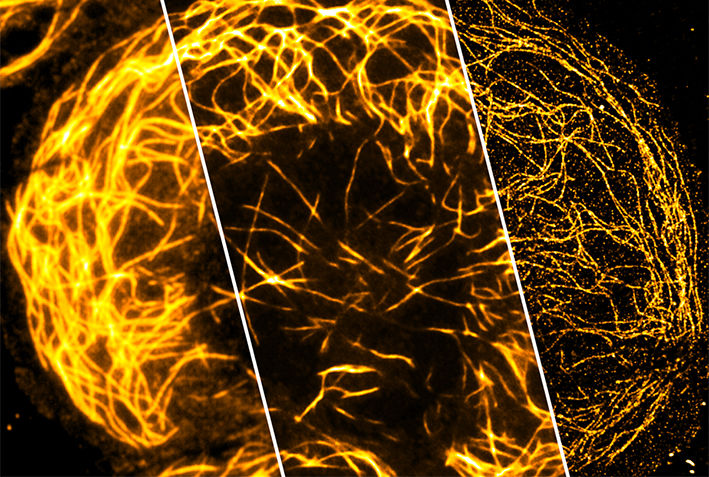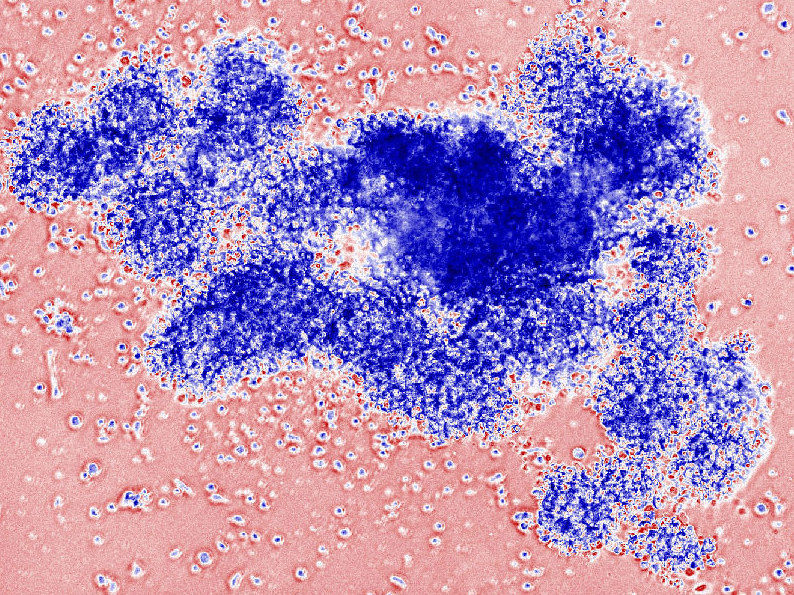Degrading modified proteins could treat Alzheimer’s, other ‘undruggable’ diseases
New technique specifically targets and breaks apart certain proteins — rather than just interfering with them
Certain diseases, including Alzheimer’s, are currently considered “undruggable” because traditional small molecule drugs can’t interfere with the proteins responsible for the illnesses. But a new technique that specifically targets and breaks apart certain proteins — rather than just interfering with them — may offer a pathway toward treatment. Researchers reporting in ACS Central Science have, for the first time, designed a compound that targets and breaks down a posttranslationally modified protein closely associated with Alzheimer’s disease.

Symbolic image
Computer-generated image
Researchers have been exploring targeted protein degradation (TPD) as a way to get at hard-to-treat proteins, namely, the ones for which inhibitors or other conventional techniques fail. Though these degraders have shown some initial promise, things can get complicated if the proteins go through “post-processing,” or posttranslational modifications, after being formed. Thus far, no TPD technique has been able to target this type of protein.
One protein that would be particularly advantageous to break down is p38, which is involved in several cellular signaling pathways and is linked to the development of Alzheimer’s disease. Although previous attempts to treat the disease by focusing on p38 have been made — including a drug candidate that went through two phases of clinical trials — they suffered from off-target effects and limited efficacy. But like many proteins, p38 goes through posttranslational modifications, including phosphorylation, to form p-p38. This adds a phosphate group to the protein, activating it and changing its shape. By homing in on this form instead, the treatment could be made more specific. So, Nam-Jung Kim, Kyung-Soo Inn, Jong Kil Lee and colleagues wanted, for the first time, to create a protein degrader that could target and break down p-p38, and potentially offer a new avenue for treating Alzheimer’s disease.
The team screened several compounds specific for p-p38, eventually finding PRZ-18002, which selectively induced degradation of p-p38 over both similar proteins and its inactivated form. In fact, PRZ-18002 maintained its selectivity even when tested against 96 different protein kinases similar to p38. When delivered to the brains of mouse models of Alzheimer’s disease, the compound downregulated the p38 pathway, improving cognitive abilities, including spatial reasoning, and disease-related brain chemistry, such as the accumulation of amyloid-beta plaques. The researchers say that this work could someday provide a novel treatment for Alzheimer’s disease and open up opportunities for future treatments of other diseases that also involve modified proteins.
Original publication
Other news from the department science

Get the life science industry in your inbox
By submitting this form you agree that LUMITOS AG will send you the newsletter(s) selected above by email. Your data will not be passed on to third parties. Your data will be stored and processed in accordance with our data protection regulations. LUMITOS may contact you by email for the purpose of advertising or market and opinion surveys. You can revoke your consent at any time without giving reasons to LUMITOS AG, Ernst-Augustin-Str. 2, 12489 Berlin, Germany or by e-mail at revoke@lumitos.com with effect for the future. In addition, each email contains a link to unsubscribe from the corresponding newsletter.
More news from our other portals
Last viewed contents

Prostate cancer: AI should help to avoid unnecessary biopsies
Crucell Announces Positive Results of Phase II Rabies Monoclonal Antibody Combination Clinical Study in Philippines
How proteins become embedded in a cell membrane

Chip-based nanoscopy: Microscopy in HD quality

Evotec receives US$ 6.6 m grant for drug discovery in tuberculosis

Kidney Transplants: White Blood Cells Control Virus Replication
Phase III data show that Novartis meningococcal vaccine Menveo demonstrated robust immunogenicity in infants - New pivotal phase III data show Menveo induced immune responses in a high percentage of infants against four important meningococcal disease-causing serogroups
Plants and stress: key players on the thin line between life and death revealed
Trans-o-flex group focuses industry expertise on new pharmaceutical competence centre - Specialist for pharmaceutical logistics wants to expand knowledge lead, develop and implement new solutions
New cancer gene discovered
Squaraine rotaxane shuttle as a ratiometric deep-red optical chloride sensor






















































